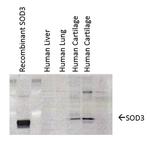Search Thermo Fisher Scientific
Product Details
MA5-45226
Species Reactivity
Host/Isotype
Class
Type
Clone
Immunogen
Conjugate
Excitation/Emission Max
Form
Concentration
Purification
Storage buffer
Contains
Storage conditions
Shipping conditions
RRID
Product Specific Information
1 µg/mL of MA5-45226 was sufficient for detection of EC-SOD in 20 µg of human cartilage lysate by colorimetric immunoblot analysis using Goat anti-mouse IgG:HRP as the secondary antibody.|Detects extracellular SOD approximately 35kDa.
Target Information
This gene encodes a member of the vaccinia-related kinase (VRK) family of serine/threonine protein kinases. This gene is widely expressed in human tissues and has increased expression in actively dividing cells, such as those in testis, thymus, fetal liver, and carcinomas. Its protein localizes to the nucleus and has been shown to promote the stability and nuclear accumulation of a transcriptionally active p53 molecule and, in vitro, to phosphorylate Thr18 of p53 and reduce p53 ubiquitination. This gene, therefore, may regulate cell proliferation. This protein also phosphorylates histone, casein, and the transcription factors ATF2 (activating transcription factor 2) and c-JUN.
For Research Use Only. Not for use in diagnostic procedures. Not for resale without express authorization.
References (0)
Bioinformatics
Protein Aliases: ALS1; EC SOD; EC-SOD; extracellular superoxide dismutase; Extracellular superoxide dismutase [Cu-Zn]; MGC20077; SOD 3; Superoxide dimutase 3; superoxide dismutase; superoxide dismutase 3, extracellular; Superoxide dismutase B; testicular tissue protein Li 175
Gene Aliases: AI314465; EC-SOD; ECSODPT; Sod-3; SOD3
UniProt ID: (Human) P08294, (Rat) Q08420, (Mouse) O09164
Entrez Gene ID: (Human) 6649, (Rat) 25352, (Guinea pig) 100718762, (Mouse) 20657

Performance Guarantee
If an Invitrogen™ antibody doesn't perform as described on our website or datasheet,we'll replace the product at no cost to you, or provide you with a credit for a future purchase.*
Learn more
We're here to help
Get expert recommendations for common problems or connect directly with an on staff expert for technical assistance related to applications, equipment and general product use.
Contact tech support



